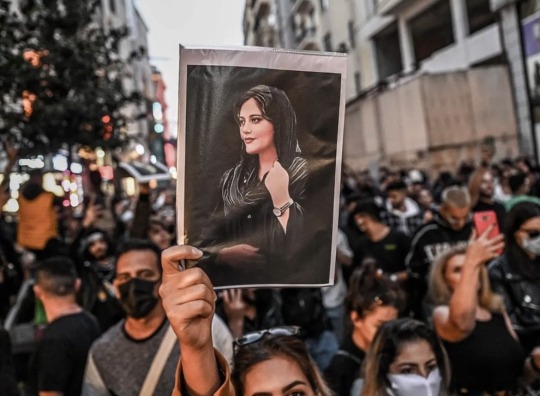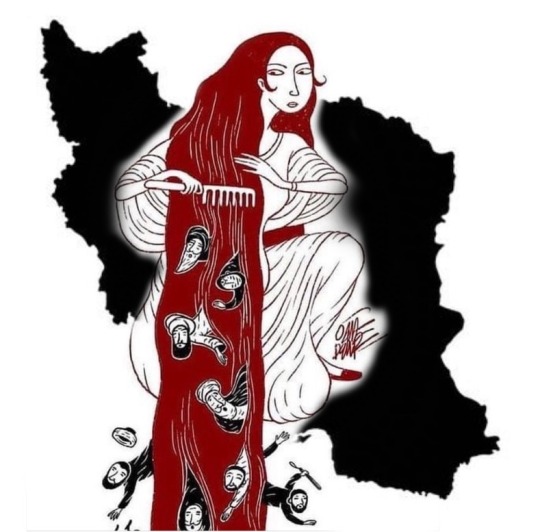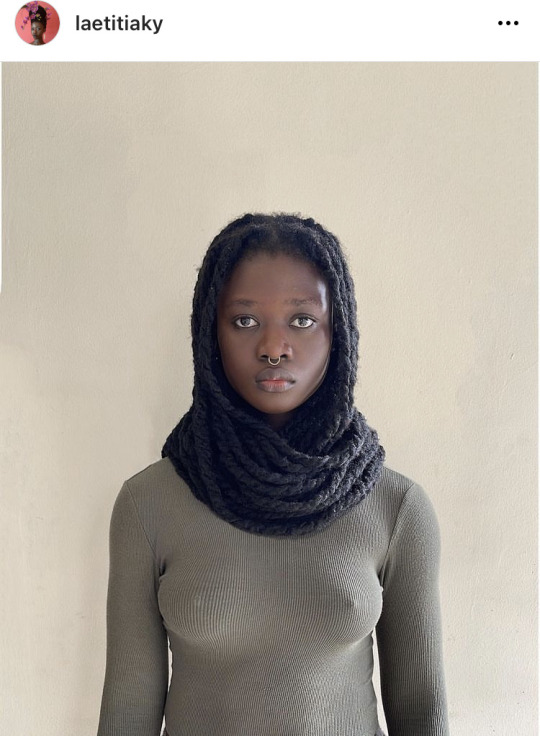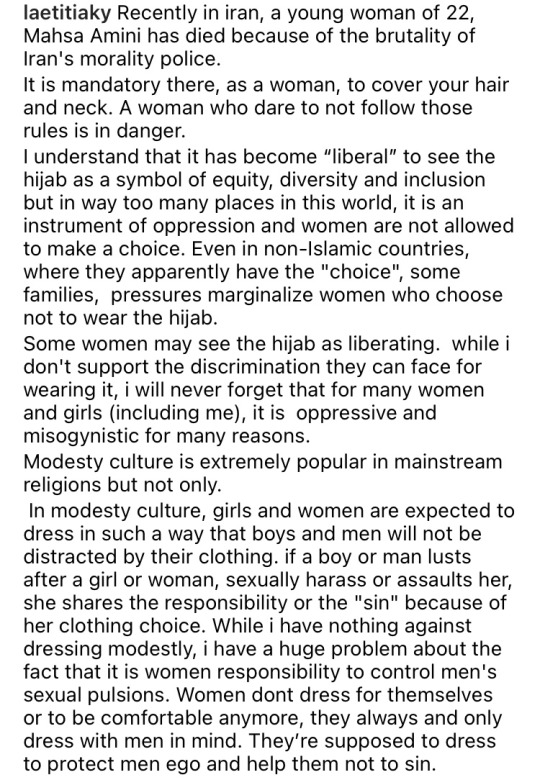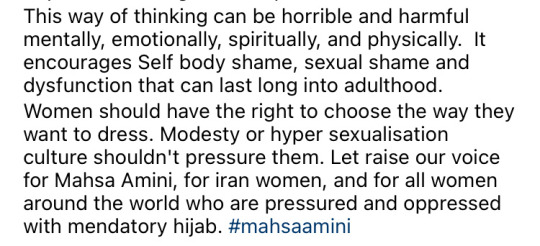Text
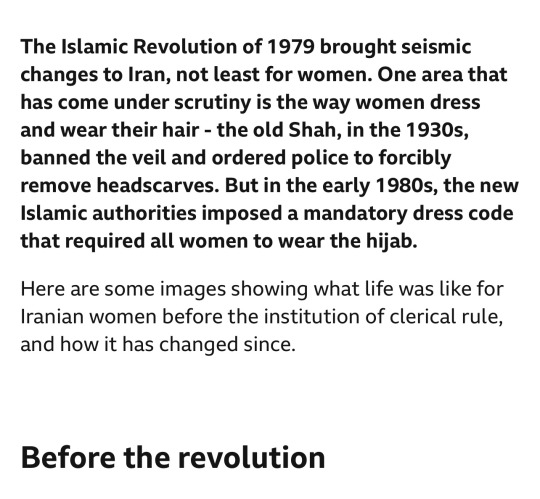
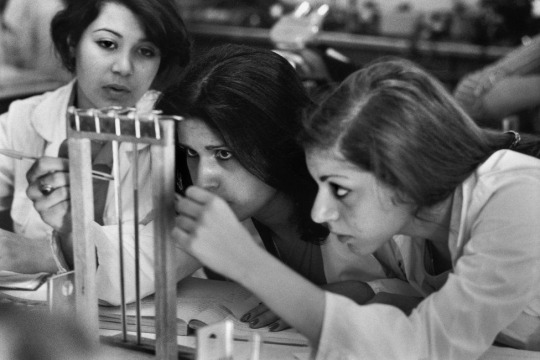
Studying at Tehran University in 1977: While many women were already in higher education at the time of the revolution, the subsequent years saw a marked increase in the number attending university. This was in part because the authorities managed to convince conservative families living in rural areas to allow their daughters to study away from home.
"They tried to stop women from attending university, but there was such a backlash they had to allow them to return," says Baroness Haleh Afshar, a professor of women's studies at the University of York who grew up in Iran in the 1960s.
"Some educated people left Iran, and the authorities realised in order to run the country they needed to educate both men and women."
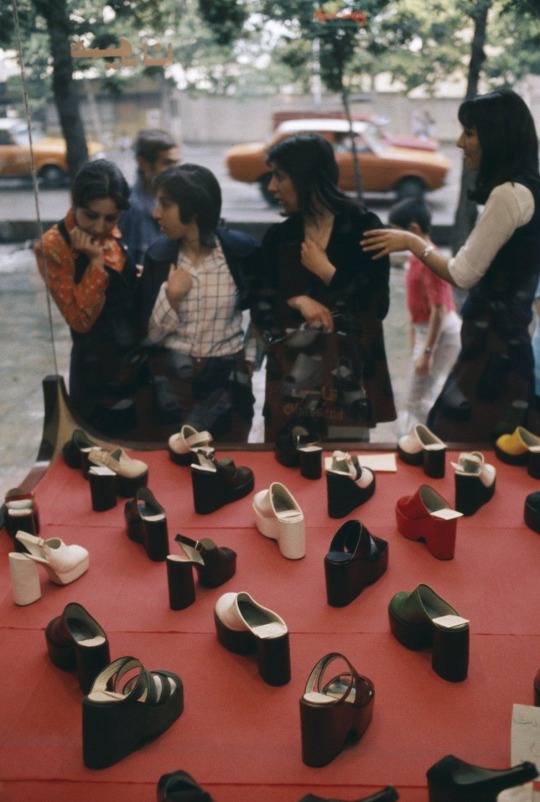
Window shopping in Tehran in 1976: Before the revolution, the hijab was already widely worn but many women also chose to don Western-style clothes, including tight-fitting jeans, miniskirts and short-sleeved tops. "The shoes haven't changed - and the passion for shoes is in all of us! Women in Iran are no different from women the world over, and going shopping is just a means for women to get away from every day stress," says Prof Afshar.
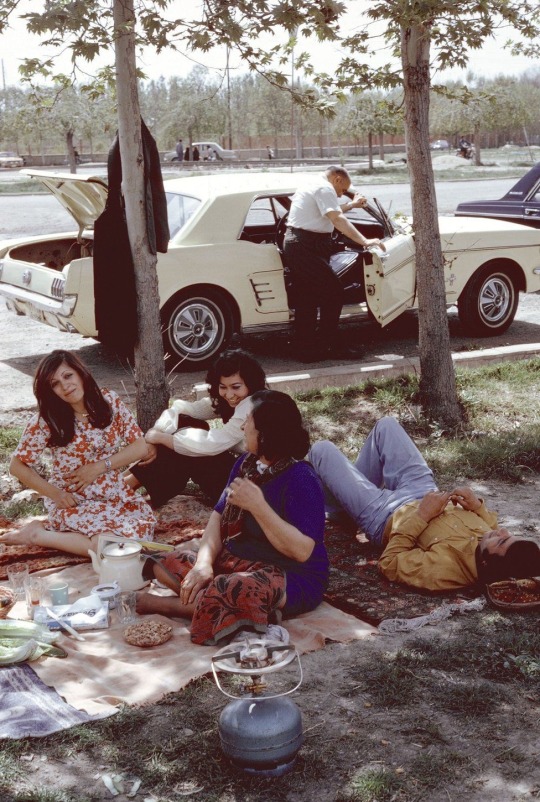
Friday picnic in Tehran in 1976: Families and friends tend to get together on Fridays, which are weekend days in Iran. "Picnics are an important part of Iranian culture and are very popular amongst the middle classes. This has not changed since the revolution. The difference is, nowadays, men and women sitting together are much more self-aware and show more restraint in their interactions," says Prof Afshar.
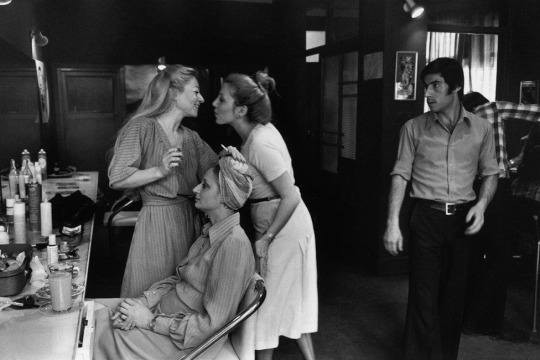
Hair salon in Tehran in 1977: "This is a scene you would no longer expect to see in Iran - but even after the Islamic Revolution, hairdressers continued to exist," says Prof Afshar. "Nowadays you wouldn't see a man inside the hairdressers - and women would know to cover up their hair as soon as they walked out the door. Some people may also operate secret salons in their own homes where men and women can mix."
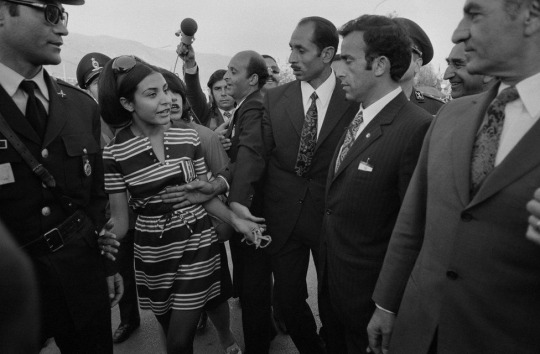
Bodyguards surround the shah in 1971: A young woman approaches Shah Mohammad Reza Pahlavi (far right) at a huge party marking the 2,500th anniversary of the Persian monarchy - the extravagance of the event was widely condemned by his left-wing and clerical opponents. "By this time, the shah was already very much disliked and some believe this image of excess and indulgence may have contributed to events leading up to the revolution eight years later," Prof Afshar explains.
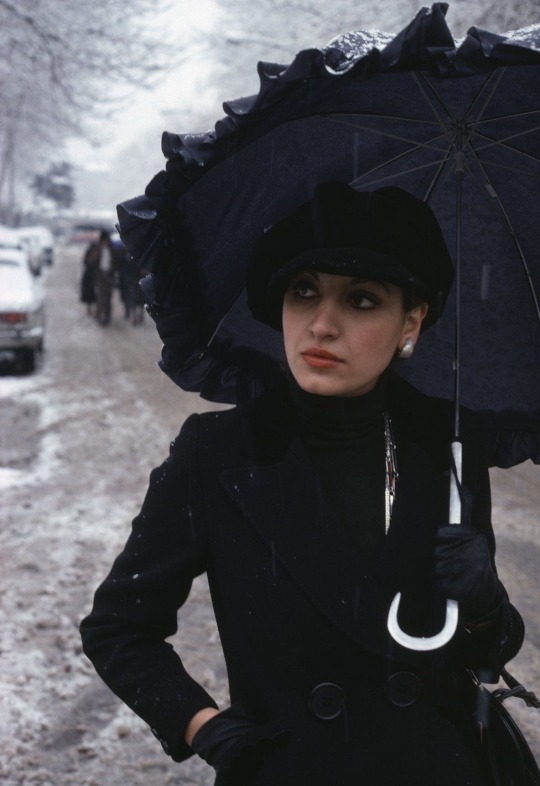
Walking down a snowy street in Tehran in 1976: "You cannot stop women walking in the streets of Iran, but you wouldn't see this today - her earrings and make up so clearly on show," Prof Afshar says. "There is this concept of 'decency' in Iran - so nowadays women walking in the streets are likely to wear a coat down to her knees and a scarf."
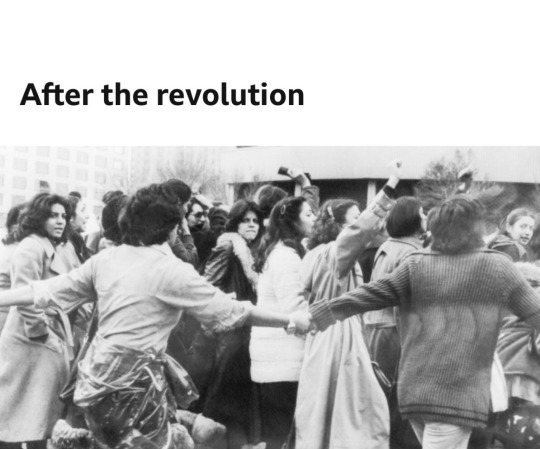
Women rally against the hijab in 1979: Soon after taking power, Iran's new Supreme Leader Ayatollah Ruhollah Khomeini decreed that all women had to wear the veil - regardless of religion or nationality. On 8 March - International Women's Day - thousands of women from all walks of life turned out to protest against the law.
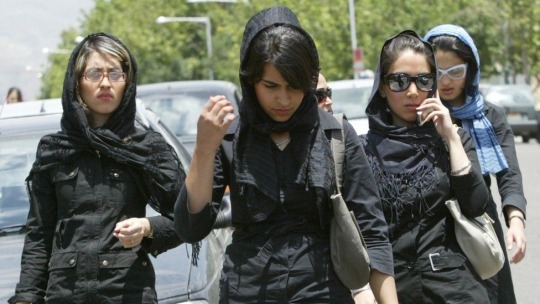
Walking in Tehran in 2005: Not all women in Iran opt to wear the black chador, a cloak that covers the body from head to toe and only leaves the face exposed. Many prefer to wear loosely fitted headscarves and coats. "The real question is how far back do you push your scarf? Women have their own small acts of resistance and often try as far as possible to push their scarves back," says Prof Afshar.

Watching football from a Tehran shopping centre in 2008: Though women were never officially banned from watching men's football matches in Iran, they are often refused entry to stadiums and some of those who have tried have been detained. Before the revolution, women were allowed to attend sporting events.
SEPTEMBER 2022: Protests, after the Morality Police beat, arrested and then murdered Mahsa Amini — for the crime of improperly wearing her hijab (source) (source)
4K notes
·
View notes
Text
A 22 year old woman was killed for the sake of wearing "improper hijab". The police brutally killed her and then tried to blame it on the hospital staff and even tried to fake her having an illness just to "justify" their actions. As if there could ever be a justification for such blatant brutality and slaughter.
Let me quote a translated line from the holy Quran for you:
"There is no forcefulness in religion."
There is no such thing as a forced religion. And Islam is not what these fiends make it out to be. It breaks my heart to see people associate Islam with them when they don't even hold to God's most treasured principle: be good to each other. Be good people. Be human.
And yet, here we are in this country. They want to force everything on us. Our beliefs, our religion, our thoughts, and even our feelings. They try to control everything about us. How inhumane of a system do you have to be to do that?
And when we protest, they silence us. They take away our internet, beat the voice out of us, and in some instances, literally kill us for crimes that we have never committed. How wrong is it that we ask to live?
Our hearts go out to Mahsa and her family, and the others who've lost their lives in the protests that have followed her unjust and evil murder at the hands of this regime. This regime, this system, is neither Islam nor is it Iran. And we are no longer staying silent.
What can you do? Be our voice. Spread awareness. This is not us, and this is not our religion. We may lose this battle yet again to bullets and blatant slaughter in the streets, but our war with this regime will never be over. Not until the day Iran is freed.
For the sake of Mahsa and everyone else who's died an unjust death at the hands of these murderers, we ask you humbly: don't let our voice die out. Don't let us be forgotten.
Sincerely, thank you, from a woman in Iran.
#Mahsa_Amini #MahsaAmini #IranProtests
#مهسا_امینی #زن_زندگی_آزادی
4K notes
·
View notes
Text
Apparently the Iranian government has flown in Hisbollah militia from Lebanon to put down the protests in Iran.
This means massacre.
They are trained killers.
It also means the mullahs and Iranian military can wash their hands off the blood of their fellow citizens.
They'll let others do the bloody work.
Please don't stop paying attention to what's happening in Iran!
Keep posting, keep tweeting!
4K notes
·
View notes
Text
Shahzad Dana entered Iran to participate in the protests

Shahzad Dana, born in Iran on May 21, 1992, an Iranian aerospace engineer, after being away from Iran for 8 years, in response to the killing of Mahsa Amini, announced that she entered Iran illegally on October 5, 2022.
According to his friends: He planned to go to Iran from October 1, but due to the conditions in Iran, he had to enter Iran illegally from the border of Armenia. He has been unavailable since October 10th and we do not know about him.
What happened on October 10th?

According to a person who accompanied Shahzad Dana from Armenia to Tehran: Shahzad Dana had a date with several people on the night of October 10, 2022, left and never returned.
#shahzad dana#mahsa amini#iranian aerospace engineer#iran#شهزاد دانا#مهسا امینی#ایران#مهندس هوافضای ایرانی
4 notes
·
View notes
Text
Nika Shakarami was nearly 17 years old when she went missing during a protest rally on september 20. when she was found, dead, 9 days later, her family was not allowed to see her head when asked to identify her body. she was filled with injuries including a smashed nose and broken skull.
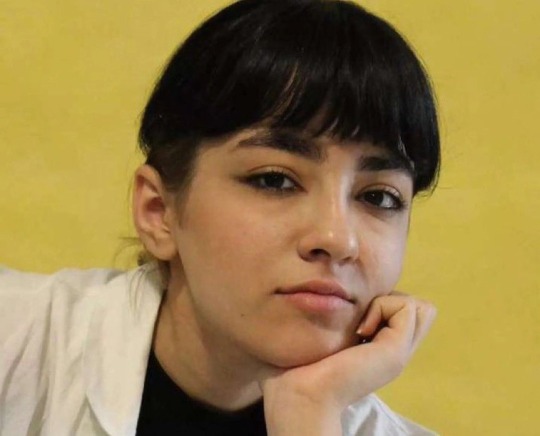

another teen girl, 16 year old Sarina Esmailzadeh, was also killed. she was reportedly hit repeatedly in the head by the police.


since the start of the protests 15 days ago, it is estimated 300 were killed and 15,000 people were arrested.
the fight for democracy and freedom in iran continues. do not forget about iranian women!
6K notes
·
View notes
Text
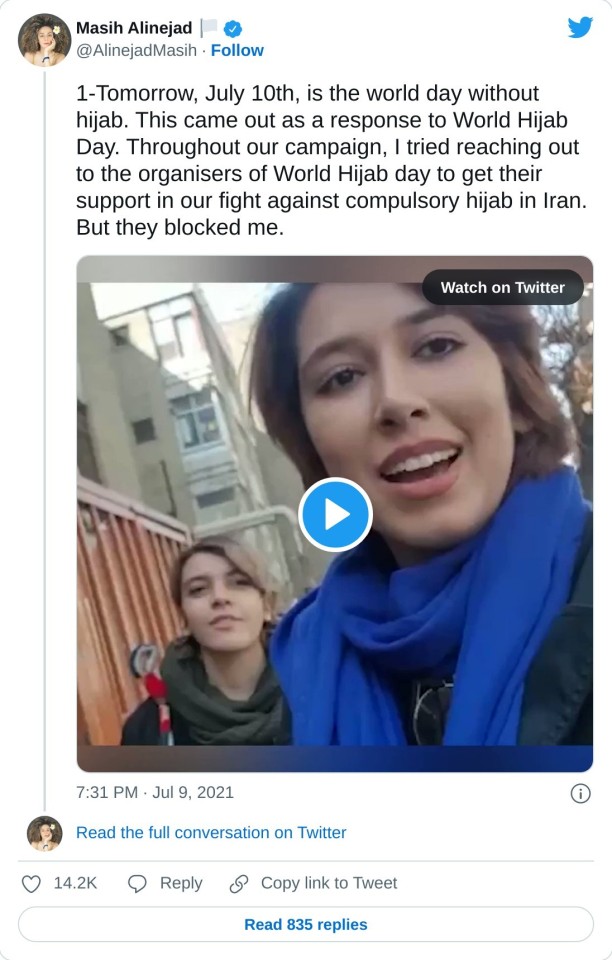

I’m in tears. My heart goes out to all the brave women and men fighting against the authoritarian religious oppression
7K notes
·
View notes
Text
Hijab - a symbol of dignity, inclusion and liberty when it is chosen to be wore.
Hijab - a symbol of oppression and cruelty when forced to be wore.
It isn't about hijab, it's about choice. If I want I will wear it, if I don't I will not. No one can stop me from doing so. Forcing someone to not wear hijab is wrong, every person has a right to do so but forcing someone to wear it is equally wrong.
The condition in Iran is not to be taken lightly. Mahsa Amini, a 22 year old was beaten to death by the police because of not wearing hijab properly. People in Iran are protesting for their rights. Women are cutting their hair off and burning their hijab to show what they want. Internet services are shutting down so that the people of Iran cannot use their voice.
It is now our responsibility to be their voice. If they can stand upto their government without any fear, why can't we be their voice?
Hijab is beautiful when it is chosen to be wore but it's beauty dies when it is forced.
If a 14 year old can understand that, why can't the whole world do?
7K notes
·
View notes
Text
Can I propose a new term? Westsplaining: when a westerner is convinced they know what’s better for your country despite not having any information on your culture, language, economy, politics, etc.
The number of times I’ve had people on this website show their wikipedia search result to me like it’s supposed to be some mind-blowing expose… bitch I know that and a lot more. You’re the one with no knowledge and context.
245 notes
·
View notes
Text
The situation is currently so wild and messed up in my country, Iran.
The government wants ALL of the people to have strong faith in Islam. They force all the women to wear hijab, even if a woman isn't even muslim.
We do not want this in our country!! Everyone should be free to choose what they want to wear, if they want to be muslim or not and if they want to wear hijab or not.
A couple of days ago, Mahsa Amini who was just a normal 22-year-old girl and was on vacation with her family got arrested, beaten and killed by the moral security police, just because she wasn't wearing hijab.
If you see a young girl get murdered by some random person in the street, what do you do? Of course you go and tell the police. But now, in Iran, the policemen are the murderers who are killing some innocent people. WHERE CAN WE REPORT THEIR CRIMES???
Lots of people in Iran are demonstrating in different places now and we're getting united against this unfair situation. But that's not enough! Many people get killed by the police in these demonstrations and we can hear the sound of shotguns echoing in the streets.
You, the people who live in other countries that are safe enough, please be our voice! Please reblog my post or even share it on other platforms. Do whatever you can! Please don't leave us alone. All we want is just freedom and justice.
Please be our voice 🙏🖤
9K notes
·
View notes
Text
here's a little news: they've cut off our internet connection like they did 3 years ago when the entire Bloody Aban situation was going on, and I'm one of the few lucky people with a tiny bit of access to come on here and literally BEG you to spread the word. people are on the streets getting killed. a 10 year old girl was shot, several teens are dead. women are being shamelessly fucking beaten (in Mahsa's case, to DEATH) by the same people who cry over historic islamic women being tortured or misbehaved a thousand years ago. do not stay silent.
10K notes
·
View notes
Text

edit: this post isn't an invitation to shit on other people's beliefs btw, it's to point out how men are oppressing women, if they weren't corrupting religion to do that, they would be using something else
also i am in no way saying that a state should be ruling by religion, please a post about saying women should have choice in what they wear should not be causing this much discourse
10K notes
·
View notes
Text
as a persian girl i really wish that everyone informs themselves about the protests in Iran !!! people have no internet access, are being killed and beaten to death on the streets. the whole political system is a joke and a threat to human rights for all people in that country. it is my duty to use my voice for these people who aren't able to do so and i hope you do the same!!!
this is a women's rights issue and a human rights issue.
15K notes
·
View notes
Text

The moment 33 year old Ghazale Chelavi was murdered by Anti-Riot police. The last thing she said was “don’t be afraid we’re all in this together”
Iranian people are fighting the dictatorship of Islamic fundamentalists.
106 notes
·
View notes

